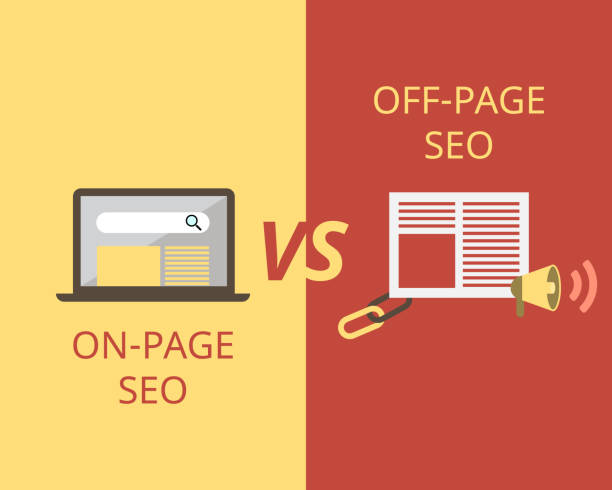When it comes to ranking higher on search engines and driving organic traffic, two terms often dominate the conversation: On-Page SEO and Off-Page SEO. Both are essential pieces of the SEO puzzle, yet they focus on entirely different aspects of website optimization. Understanding the difference between the two and how they work together, is necessary for building a well-rounded SEO strategy that delivers long-term results.
On-Page SEO is everything you can control directly on your website to improve its visibility. This includes optimizing your content, improving site structure, and enhancing the user experience. Think of On-Page SEO as the foundation of your house — without a strong and solid base, nothing else really matters. Search engines reward websites that offer valuable content and a smooth experience, so getting On-Page SEO right is non-negotiable.
On the other hand, Off-Page SEO involves actions taken outside your website to strengthen its authority and reputation. It is like word-of-mouth marketing — when other trusted sites link to your content, it signals to search engines that your site is credible and valuable. Off-Page SEO often takes more time and effort since it relies on external factors, but it is vital for building long-term domain authority and climbing search rankings.
While both approaches have different focuses, they complement each other. A website with perfectly optimized content (On-Page SEO) but no external validation (Off-Page SEO) may struggle to rank, while a site with strong backlinks but poor content can lose user trust and engagement. Balancing both ensures your site is both search engine-friendly and user-friendly.
Let us go in deeper into their key differences and how you can master both to boost your website’s performance.
Table of Contents
What is On-Page SEO?
On-page SEO refers to all the elements you can control directly on your website. It focuses on making your site more appealing to both search engines and users by ensuring your content, structure, and performance meet the highest standards.
Key Elements of On-Page SEO:
• Content Quality: High-quality, relevant, and engaging content is the backbone of On-Page SEO. Search engines prioritize content that provides real value, answers users’ questions, and keeps them engaged.
• Keyword Optimization: Using the right keywords naturally throughout your content helps search engines understand what your page is about and rank it for relevant searches.
• Title Tags and Meta Descriptions: These elements appear in search results and impact click-through rates. A compelling title and a clear meta description improve visibility and encourage users to visit your site.
• Header Tags (H1, H2, H3): Proper use of header tags structures your content, making it easier for both users and search engines to navigate and understand your page.
• Image Optimization: Compressed, high-quality images with descriptive alt text improve page speed and accessibility, enhancing both user experience and SEO.
• URL Structure: Clean, descriptive URLs make your site easier to navigate and help search engines understand your page’s content.
• Internal Linking: Linking to other relevant pages on your site helps distribute authority and keeps users engaged longer.
How to Master On-Page SEO:
1. Create Valuable Content: Focus on delivering in-depth, well-researched, and helpful content that solves your audience’s problems.
2. Optimize for Keywords: Conduct thorough keyword research and use relevant terms naturally throughout your content, headings, and meta tags.
3. Improve Site Speed: Use tools like Google PageSpeed Insights to identify performance issues and optimize your website’s loading time.
4. Enhance Mobile Experience: Ensure your site is mobile-friendly, as Google prioritizes mobile-first indexing.
5. Use Schema Markup: Structured data helps search engines better understand your content and can lead to rich snippets in search results.
What is Off-Page SEO?
Off-page SEO involves external factors that influence your website’s authority, credibility, and ranking potential. It is about building relationships and earning trust from other sites and audiences.
Key Elements of Off-Page SEO:
• Backlinks: Links from other reputable websites act as votes of confidence, signaling to search engines that your content is valuable.
• Social Signals: Shares, likes, and engagement on social media indicate your content’s popularity and relevance.
• Brand Mentions: When your brand is mentioned online, even without a link, it can boost your site’s credibility and authority.
• Guest Blogging: Writing high-quality content for other reputable websites helps you reach new audiences and earn backlinks.
• Influencer Outreach: Collaborating with influencers in your niche can drive traffic and enhance your site’s visibility.
• Reviews and Testimonials: Positive feedback on third-party platforms builds trust and signals quality to search engines.
How to Master Off-Page SEO:
1. Earn Quality Backlinks: Focus on getting links from high-authority, relevant websites through guest posts, collaborations, and content outreach.
2. Leverage Social Media: Promote your content on social platforms to drive traffic and increase engagement.
3. Engage in Online Communities: Participate in forums, groups, and discussions related to your niche to establish authority and share your expertise.
4. Monitor Brand Mentions: Use tools like Google Alerts to track mentions of your brand and request backlinks where appropriate.
5. Encourage Reviews: Ask satisfied customers to leave positive reviews on platforms like Google My Business and Trustpilot.
Conclusion: Why You Need Both On-Page and Off-Page SEO
On-Page and Off-Page SEO aren’t competing strategies — they are complementary. On-Page SEO ensures your content is valuable and optimized, while Off-Page SEO builds your website’s authority and trust. Without On-Page SEO, even the best backlinks won’t help your site rank well. Without Off-Page SEO, your content may struggle to reach its full potential in search results.
By mastering both, you create a well-rounded SEO strategy that drives consistent traffic, builds credibility, and keeps users engaged. Start with solid On-Page SEO as your foundation, and then amplify your efforts with Off-Page tactics to see real, lasting results.
Let your SEO strategy thrive by balancing both approaches — because when they work together, the results speak for themselves.





